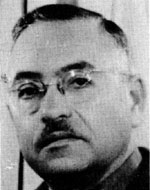Son of Shmuel and Esther. He was born on the 18th of Nissan, April 16, 1911 in Budapest, Hungary. From his youth, he was distinguished by his talents, in the sciences of mathematics and physics. In Budapest, he participated in solving mathematical problems in a periodical, of a scientific department. He completed his studies in medicine, and after working at the local university hospital, he was awarded the title of specialist in internal medicine. He was a doctor in a military hospital in Hungary, and served as a medical officer in the Hungarian army. With the hardships of World War II, he was swept to the front, and eventually captured by the Russians. In his captivity, he worked very hard, under very difficult conditions, as a chief doctor in a large prison camp in the Kursk region. After his return from captivity, he visited Budapest. When he saw what the war had done to his country, and what the people in it had become, he decided to move on. From 1945-1946 he served as a doctor in a refugee camp in the American occupation zone in the city of Gans in Austria. In the years 1946-1947 he ran a clinic in Cyprus. In addition to the medical assistance he provided to She’erit Hapleta, he also tried to improve their living conditions and their agriculture. He established friendships with members of “Sefich”, who founded Kibbutz Beit-Kama. In February 1948, he arrived at the shores of the country, on the illegal immigrant ship HaTikvah. Since his expertise was recognized and approved in Israel, he began his medical service in the IDF in September 1948. During his twenty years in Israel, he devoted most of his time and energy to the medical positions in the IDF. He was the district doctor at the Negev District Command and was promoted to Major. During the War of Independence, he provided medical assistance to the wounded, who were transferred from the outposts in the vicinity of Revivim. He was the physician of the defenders of Tekuma, Beerot Yitzhak, Dorot and Shoval in the besieged Negev. In Mivtahim, together with a medical team, he set up a hospital. In 1956, a deputy medical officer was appointed in the Southern Command and was responsible for the evacuation of casualties. In this role he worked extensively, during the Sinai Campaign for many years. From 1963, he served as chairman of the medical committee, in the enlistment office in the south, and he was on duty in the Six Day War. His many commanders and acquaintances recognized his virtues, respected him, and appreciated his actions. They learned to know him as a great cultural man, as a loyal friend, and as a devoted husband and father. He settled in Be’er Sheva, after the War of Independence. Every day of the week, he would go to work, or to the house of a sick soldier. His sense of humor and resourcefulness in every situation, brought him many friends. At work and at home, he influenced the joy of life, with his wisdom and love. He was well versed in music and loved to listen and enjoy classical works. He died of a heart attack, on the 11th of Elul, September 3, 1968, while performing his duties in the recruitment office. He left a wife and daughter. He was laid to rest in the cemetery in Be’er Sheva. From different places in the country, and among the inhabitants of his city, friends and acquaintances flocked to pay their last respect, because of his devotion and loyalty to the job, for the training he kept for his comrades in the army, for his honesty and humility, and for his noble simplicity, traits that earned him the love of mankind. The Chief Medical Officer wrote in a letter of condolence to his wife: “I find it appropriate to note his dedication and loyalty. I am aware that he devoted most of his time and most of his care to the health of our soldiers.” In his memory, a Torah scroll was dedicated to the central hospital in the Negev.
